MercoPress. South Atlantic News Agency
Tag: whales
-
Monday, May 9th 2011 - 19:12 UTC
Australia submits Japan’s Antarctic whaling program to the International Court

The Australian government filed a written submission at the International Court of Justice in Netherlands calling for an end to Japan's Antarctic whaling program on the grounds that it breaches the international ban on commercial whaling. Australia made the official presentation of its case Monday at the ICJ.
-
Monday, April 18th 2011 - 09:57 UTC
Pacific male humpback whales change their mating songs over a two year period

Male humpback whales have their own version of the hit parade, researchers say. Within regional populations of the whales, males all sing the same mating song. But the pattern of the song changes over time, with new versions spreading across the ocean and nearly always from west to east, according to the study published online this month in the journal Current Biology.
-
Saturday, March 19th 2011 - 22:54 UTC
Falklands reports grounding of a pod of 400 pilot whales
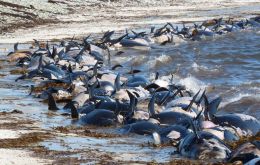
A record grounding of an estimated 400 pilot whales was reported this week in the Falkland Islands.
-
Friday, February 18th 2011 - 06:00 UTC
Japan announces the end of its annual whale hunt in Antarctica
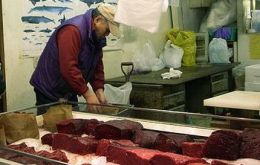
Japan ended its annual whale hunt in Antarctica early following clashes between its fleet and protesters, Agriculture Minister Michihiko Kano said.
-
Tuesday, February 15th 2011 - 05:45 UTC
Latinamerican countries call on Japan to cease “scientific whaling”
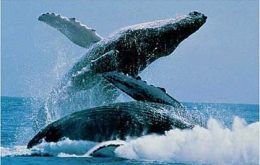
Nine Latinamerican countries that make up the “Buenos Aires Group” have called on Japan to put an end to “scientific whaling” as vessels take off for the new hunting season in the Southern Hemisphere.
-
Sunday, February 6th 2011 - 08:26 UTC
Pod of 80 whales beached on New Zealand coast; at least 14 dead
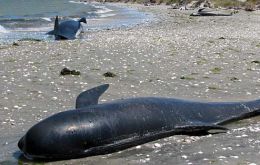
At least fourteen whales from a pod of more than 80 beached on the New Zealand coast have died, with officials fearing others may be stranded elsewhere after freeing themselves on Saturday.
-
Monday, January 10th 2011 - 06:33 UTC
Wikileaks uncovers secret whaling agreement between U.S. and Japan involving Sea Shepard

Recent Wikileaks cables have exposed classified material sent by the United States embassy in Tokyo to the National Oceanographic and Atmospheric Administration's (NOAA) National Marine Fisheries Service (NMFS).
-
Friday, December 24th 2010 - 07:30 UTC
Japanese Fishing Agency officials admit taking “gifts” of whale meat

After more than two and half years of pressure by Greenpeace and the famous “Tokyo Two” trials, officials with the Japanese Fishing Agency publicly admitted Thursday that they received whale meat as “gifts” from private companies contracted by the government to slaughter whales, reports Greenpeace USA blog.
-
Tuesday, December 14th 2010 - 06:38 UTC
Whaling and non-whaling countries call for restrain ahead of new hunting season
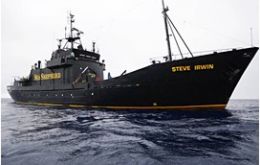
Four countries, Australia, New Zealand, the Netherlands and United States have jointly expressed concern over confrontations between Japanese whaling ships and anti-whaling activists in Antarctic waters and called for responsible behavior by the two sides.
-
Thursday, November 11th 2010 - 19:46 UTC
Whales’ skin suffer from exposure to the sun, much like with humans

The sun's rays can “burn” whales' skin, just like they can damage human skin, according to a team of researchers. The scientists studied more than 150 whales in the Gulf of California.
